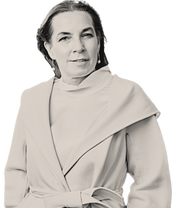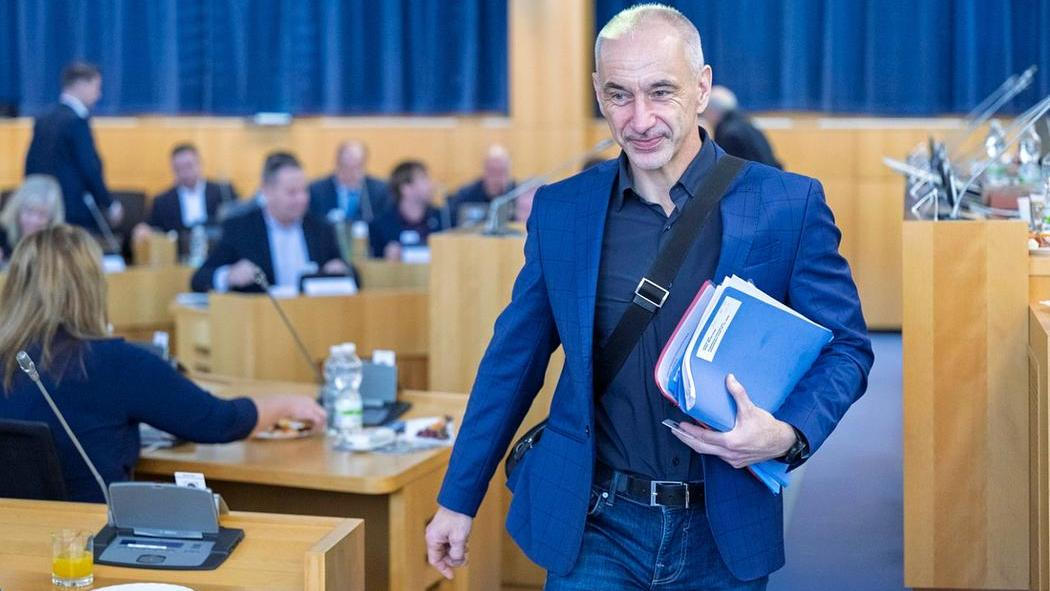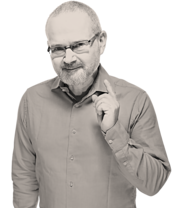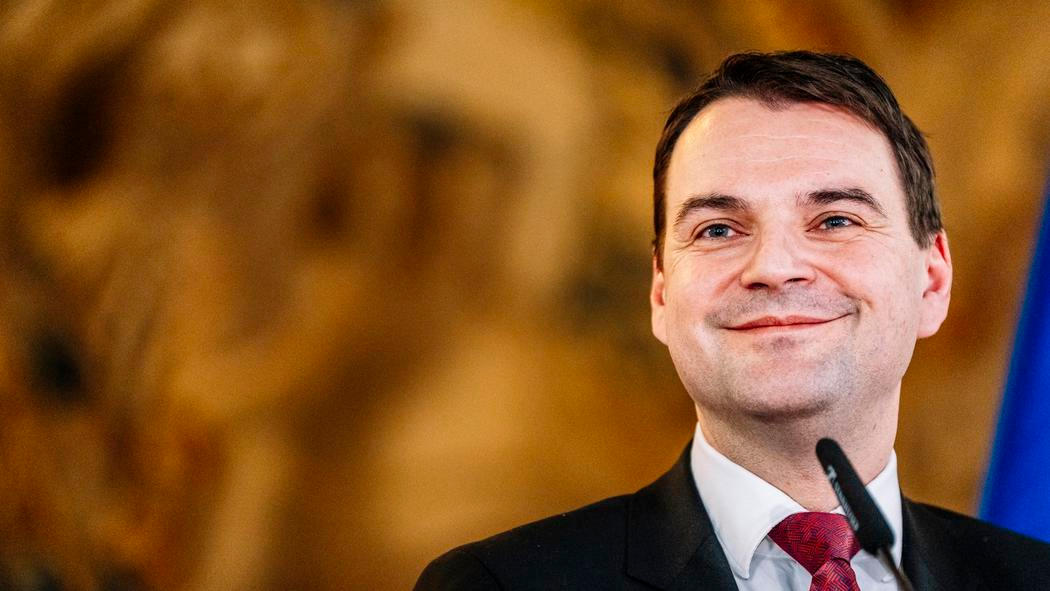Even though most of the focus, when we talk about medicine, shifts toward covid and managing the pandemics, the Czech Republic can be really proud of the quality of its oncological care. According to Dr. Robert Cook, who took part on the Economist Impact study on oncology in twenty nine countries, in which the Czech Republic was ranked 8th, it is remarkable what the Czech oncologists can do having in mind how little money is being invested into oncology in the country. "The country scores very high in oncology policy, planning and strategy of care. For the care that people get, this is also very high quality. Also, we scored data collection and screening programs highly. Finally, thinking about your complex oncology centers and the specialization of care. Here, the Czech Republic has also stood out," says Dr. Cook in an interview with Jan Růžička.
Today we will talk about healthcare! But for once, our debate won't be on covid (thank God!). We will talk about public health, oncology, and prevention. And, about an Economist Impact study on Cancer preparedness that has just released a large paper about the Czech Republic and Czech system of Oncology care. Therefore, I am super happy; I can talk today with Dr. Robert Cook, the Clinical Director of Economist Impact, the research arm of The Economist Group. Dr. Cook lead a team of analysts who have already looked at almost 30 national oncology systems, the Czech Republic becoming the last piece in the puzzle. So, dear Dr. Cook, it's great having you!
Pleasure is mine Jan!
Before we begin, I will have two teasers and one information. Who would like to read the entire study, you can find it by clicking on valkaprotirakovine.cz. And who is even more interested in the subject, on Tuesday 30th November the whole study will be presented in Prague as part of a conference attended not only by Dr. Cook, but also prof. Canellos from Harvard University Medical School, or prof. Galuzzi from Cornell University Medical School. The conference will take place from 13:00 to 19:00 Czech time, and who would like to join and watch online, you shall write to [email protected] and ask for a link. The entire project of the Czech Republic's involvement in the Cancer preparedness study took place with the support of the PPF Group.
I am looking forward to coming to Prague!
My first question will be about public health: Even though you used to be a general practitioner, you have spent the last twenty years in public health. And public health unfortunately has been a sort of pariah of healthcare, especially in the Western world. For decades it stayed in the closet; not many people had been interested in it and it was underfunded and seen as unimportant. Now covid has changed everything, the media, politicians, and even people drinking beer at the pub are talking about public health. How do you feel about it?
It's a good observation, what you just said; the whole public health field has indeed been seen to wake up. Not only policymakers, but also ordinary people are now truly interested in it. I listen to the BBC regularly, and I am amazed how many epidemiologists are invited guests and how often they appear. Honestly, many are now household names. Prior to this I didn't even know how many epidemiologists there were in the UK.
It is also interesting how much people have started to think about numbers and data when talking about healthcare. Before covid, healthcare was a very individual thing, but now people have begun to understand the population, societal and economic consequences of good health and healthcare.
There is an old saying that generals always prepare to fight their last war rather than the next. From this perspective, maybe the COVID is a sort of wake-up call because this pandemic might be the first among many upcoming societal, complex health issues we will need to deal with. There is aging, instability of health financing, microbial resistance...
This is totally true...
And all those challenges will need our focus, effort, and a lot of money. There is no free lunch in healthcare.
You know, public health has always faced a problem. That is, it frequently needs to take a long-term view on things. This is in contrast to modern societies with very fast news cycles or low attention spans. Politicians in democracies often think about the electoral cycle and their party’s prospects for reelection, for example. Few people were interested in what will happen in ten years or longer. Sad but true. However, there are opportunities to change this, if we recognize the underlying causes of short-termism.
For example, healthcare has become so complex an endeavor that it is now difficult for one person to fully understand it. It is no longer only about access to health facilities or high-quality drugs. Good health, from a personal and societal perspective, is now about our behavior, about stress, food, clean water, and the complex environment around us, including the effects of climate change.
Because politicians come and go, health systems themselves need to consider how to reposition themselves to address new approaches to health and societal needs. Acknowledging that Covid took us totally by surprise, we need to ensure we focus on the future and prepare better for when something similar threatens us again.
Let's take one step down and focus on the intriguing point you mentioned: our behavior and its impact on our health. Thanks to big data and enough computing power, we see, also in a quantitative manner, that our behavior impacts our health by 40%. Then, there are genes, 30%, socio economic aspect & access to health, 15%, the quality of the healthcare system, 10%, and finally environmental exposure, 5%. Therefore, and clearly, our behavior constitutes a critical element of our health.
Thus, do you think the behavioral economy approach, for example in the form of nudges, might be a good strategy for how to positively influence our behavior?
Yes, that's an interesting question. I think it's possible to use them, but first, we need to break down the prevention pathway into separate parts. Not all of them are suitable for nudges and different forms of interventions might be required. For the hardest behaviors that require lifelong lifestyle change, like weight reduction, or smoking cessation, complex strategies are needed. Nudges have been shown to work here, but are probably best combined with public health campaigns, positive social media activism, structural reforms and also financial incentives in some form...
For more straightforward problems, like promoting vaccination against covid, here simple nudges might be helpful. For example, opt-out, rather than opt-in techniques.
Finally, we should not ignore possible inequalities in health outcomes, health access, and broader socioeconomic factors. For behaviors to change, most people need accurate information to make decisions and both the opportunity, and motivation to embrace a healthier way of life.
Some people argue against nudges, saying that they are just pure manipulation.
To a certain extent this is true. My view is that we are often prone to being manipulated all the time and everywhere anyway. Social media, e-commerce, and even product placement in old-fashioned grocery stores are examples. Just think about a candy stall full of chocolates next to every cashier that is waiting for children. Fortunately, this is being changed, at least here in Britain. I find sometimes it's now quite hard for me to find my favorite bar of chocolate in a supermarket. Before, it was next to the cashier!
This, to me at least, seems a positive example of nudging that isn't necessarily manipulation. By reducing the opportunity to pick up a chocolate bar on the way out, I'm not prevented from planning to pick it up when walking around the whole shop, it just reduces my short-term thinking and changes a habit.
How to apply this to more complex and expensive parts of medicine: like diabetes or oncology? To persuade people to live better and also not avoid/miss their check-ups and preventive screenings?
I think there is a place for nudging as well. Again: for example, an opt-out mechanism for health checks and oncology screenings, when people will get their place scheduled automatically in places that suit them and well in advance. To create a seamless pathway and seamless access to care. Also, to apply digital technologies much more to communicate with people more frequently. – People use apps now for everything from payments and groceries; with obvious security and confidentiality safeguards why not use them more when communicating with your family physician.
Maybe let's chunk this oncology pathway into a few pieces. First, there is a problem with our behavior: pollution, junk food, stress, smoking, etc. Here I like public health marketing quite a lot. But in a modern way: KOLs, influencers, social media, gamification, and ideally with some financial nudges to support good behavior. Then, there is the second pot, which is real prevention: checkups, mammography, ultrasounds, colon cancer screenings, and so on. And here, we need a more seamless pathway, as you pointed out. And finally, there is the treatment, which shall be centralized and accessible as much as possible.
Yes, I think it is essential to break it down into a pathway because different pieces need different approaches, and the more upstream we go, it tends to get more complex and complicated. It's not about healthcare only, but also education, employers, environment, including the play of socioeconomic disparities.
Fixing some of these upstream changes is not fast nor easy. Just think about smoking cessation. How quickly, if you do stop smoking do you accrue the benefits of a healthier lifestyle? And the same goes for dietary change. How quickly will a healthy and nutritious diet bring you to a healthy weight and then better health status? The changes can be made very fast, but maintaining them needs more focus. How can they become a habit? So here we come to the role of family and upbringing because it's much easier and better to develop healthy habits as a child.
Let's talk now more about oncology. As a researcher for Economist Impact, you were very much involved in an extensive international survey around cancer care preparedness. You analyzed the quality of prevention, treatment, and care for oncology patients in almost 30 health systems around the globe. And just recently you finished a study on the Czech Republic. Could you tell us a little bit more about this global initiative?
This is a significant initiative that's been running for several years now. We have developed an extensive scoring system to evaluate national oncology systems and rank countries based on their preparedness to tackle cancer. We looked at a range of policies in prevention, funding approaches, infrastructure, access to innovation, and the connectivity of oncology care to broader health systems. The focus was not only about the indicators of policies in place but also about their actual implementation. That's why we also look for evidence that countries are doing what their own guidelines and policies advise them. Finally, we try to show countries what and how they could improve their oncology care.
So how do you see our oncology system in the Czech Republic?
The Czech Republic is very good. I mean very, very good: in our international ranking, you are number 8th out of 29 countries.
That is great!
The country scores very high in oncology policy, planning and strategy of care. For the care that people get, this is also very high quality. Also, we scored data collection and screening programs highly. Finally, thinking about your complex oncology centers and the specialization of care. – Here, the Czech Republic has stood out also.
What shall we improve?
One aspect might be the connection between policies, such as screening programs or centralization of care, and their actual implementation into practice. You know, guidelines are one thing, but you need to live by them. Another point made by this research is that the political will to change what needs to be changed could be more decisive. But I understand that life is about priorities and oncology is only one part of medicine, and healthcare is only one part of a government's responsibilities.
There are not only great, centralized oncology centers full of professors and expensive equipment...there is also the grassroots level of medicine we shall not forget about: regional hospitals and primary care. And especially primary care physicians shall constitute a strong, confident first block of healthcare: as gatekeepers, as advocates, like a gateway, both upstream and downstream.
I think primary care could have a more substantial role in many areas and not only in oncology. By primary care I don't mean only physicians, but also nurses, dentists, pharmacists, physiotherapists and optometrists. All are essential making first contact with people as the base of a properly functioning health system. Unfortunately, maintaining good connections and collaboration between these groups and with hospitals can be challenging. And it is not only about information going from primary care to oncology centers but also from the centers to primary care. Primary care clinicians often know their patients well and can help guide through the system. Modern cancer care is a multiple specialty system now.
Yes, and it is not only about care itself, but also about the quality of life. Not to measure only life expectancy but the quality of life we give to patients when treating cancer.
Now we are talking about pathways again, which is good. Before, it was about upstream, now we go downstream. You know, many, many people, who unfortunately develop cancer, begin to value life itself. Many of them will aim to live a much fuller life...perhaps trying to do all the things on their bucket lists, the things they always wished to do. To do this we need to acknowledge how important it is to survivors of cancer to live fully and with a good quality of life.
When we connect that to cancer care, we open the topic of palliative and community care.
Yes again we come back to primary care. On the one hand: high-end care needs to be centralized, but on the other hand, care that is connected to this desire for quality-of-life aspect needs to be as local as possible. And here, I think we often underestimate the value of continuity of care that can be provided in primary care.
Now we are nicely coming to the ethical aspect of healthcare and of oncology. When to care, how to care but also when to stop to care. And by stopping the care, I mean stopping curative intervention and thinking about palliative care that shall be as close to your home as possible. Because from a holistic perspective, there is the beginning of life, and there is also an end, as part of what we can call the mystery of life.
Another way of saying this is that "It's not about when you die, but it's about how you die". Discussions about this can be very individual. And I think modern medicine offers more options now that was the case in the past. Some patients want to stay at a hospital, some at palliative care, some at a hospice, and some of them want to stay home with their families. Every option has to be a balance, between its pros and cons also. This applies to health access and delivery, too. Thus, it's a task for policymakers to allow the health system to offer a range of options for patients and their families to choose.
If you think about it, in our whole conversation, we are talking about patients as about clients. We talk a lot about the pathway, patient centricity, and customer experience. And sometimes health professionals have a bit of a problem embracing this patient centricity; some of them still think about patients as machines... as bodies that shall be treated. However, we see that a holistic approach is necessary to get quality output out of healthcare. We also talked about that a lot in connection to behavioral and societal aspects of health.
I do recognize this as a long-term trend and long-term transformation, which has been with us for many decades. True shared decision-making between health professionals on one side and patients and family on the other side is a positive approach, but it does take extra time. And yes, there are and there always will be tensions; but that is normal.
Maybe let's finish by coming back to the Czech Republic. Your research in cancer and oncology preparedness won't be possible without analyzing the broader context of the overall health care system. Any last advice on what we could do better?
Interesting question. I think first would be to use the experience of the pandemic to consider what went well and what didn't. Reflecting on such an extreme health system shock provides much to learn from. Here I would like to say that infectious diseases are not going away anytime soon and we shall get ready for further shocks. The rapid development and approval of innovations, vaccines and antiviral therapies for example, shouldn't be forgotten.
Then, there are non-communicable diseases: cardiac diseases, diabetes, cancer, and many others. that are a significant financial burden for health systems and the whole society. Here the long term goal should be to go upstream as much as possible into the preventive activities that work. Money spent on prevention often provides good return on investment over the long-term.
Then, there is the sustainability of healthcare itself: financial constraints are looming in most parts of the world and because of aging populations, new technologies and the undersupply of health professionals, system capacity will continue to be challenged. Progress in healthcare needs a long-term perspective. It takes time to train health professionals and time for many preventive interventions to bring about improvements, let’s not forget that.
Finally, the stance of countries on environmental sustainability, climate change, and international health are important pillars of global economic and societal health and stability. Healthcare is becoming more driven by equity and in the future will be a lot about this. What happens in other countries affects us all.
Excellent finish! Thank you, Doctor Cook, for the wonderful conversation.
It has been a pleasure and see you in Prague.
Dr. Robert Cook
Dr. Robert Cook is Clinical Director of Economist Impact, the insight and policy arm of The Economist group. Furthermore, he served as a deputy director and adviser to the prestigious National Institute for Health Research. Dr. Cook is a general practitioner by training and practice.
PhDr. Jan Růžička, MBA
Jan is a Chief External Affairs Officer at the Home Credit Group, the world’s leading consumer finance provider. Based out of Hong Kong, Jan runs company networks in the US, Asia, and Europe. Before that, he used to live in Beijing, Cambridge, and Prague. He even spent ten years working for the Czech Government, advocating, and shaping the health reform as the Director-General at the Ministry of Health. Jan teaches Behavioral Economy and the Disruption of Finance and Healthcare at universities in Asia and Europe. He is especially interested in how innovation can create financial inclusion and health equality.









